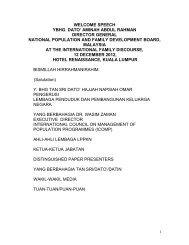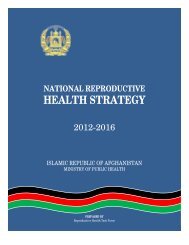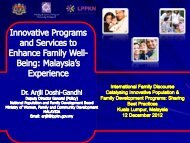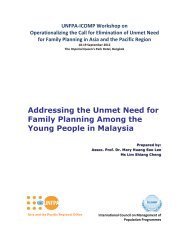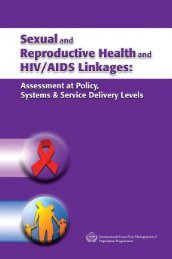Family Planning in Asia and the Pacific - International Council on ...
Family Planning in Asia and the Pacific - International Council on ...
Family Planning in Asia and the Pacific - International Council on ...
You also want an ePaper? Increase the reach of your titles
YUMPU automatically turns print PDFs into web optimized ePapers that Google loves.
had to adjust <str<strong>on</strong>g>the</str<strong>on</strong>g> <str<strong>on</strong>g>in</str<strong>on</strong>g>termediate objectives periodically,however, <str<strong>on</strong>g>in</str<strong>on</strong>g> resp<strong>on</strong>se to chang<str<strong>on</strong>g>in</str<strong>on</strong>g>g circumstances. Indeedas <str<strong>on</strong>g>the</str<strong>on</strong>g> programme exp<str<strong>on</strong>g>and</str<strong>on</strong>g>ed rapidly dur<str<strong>on</strong>g>in</str<strong>on</strong>g>g <str<strong>on</strong>g>the</str<strong>on</strong>g> 1970s <str<strong>on</strong>g>and</str<strong>on</strong>g>1980s new approaches were c<strong>on</strong>stantly be<str<strong>on</strong>g>in</str<strong>on</strong>g>g tested <str<strong>on</strong>g>and</str<strong>on</strong>g>applied to <str<strong>on</strong>g>in</str<strong>on</strong>g>crease coverage <str<strong>on</strong>g>and</str<strong>on</strong>g> <str<strong>on</strong>g>in</str<strong>on</strong>g>stituti<strong>on</strong>alize FP as asocial norm. By <str<strong>on</strong>g>the</str<strong>on</strong>g> 1990s <str<strong>on</strong>g>the</str<strong>on</strong>g> majority of couples werealready practis<str<strong>on</strong>g>in</str<strong>on</strong>g>g FP, <str<strong>on</strong>g>and</str<strong>on</strong>g> <str<strong>on</strong>g>the</str<strong>on</strong>g> depth of <str<strong>on</strong>g>the</str<strong>on</strong>g>ir commitmentwas dem<strong>on</strong>strated by <str<strong>on</strong>g>the</str<strong>on</strong>g>ir resolve to c<strong>on</strong>t<str<strong>on</strong>g>in</str<strong>on</strong>g>ue even whensome supplies were disrupted for awhile dur<str<strong>on</strong>g>in</str<strong>on</strong>g>g <str<strong>on</strong>g>the</str<strong>on</strong>g> heightof <str<strong>on</strong>g>the</str<strong>on</strong>g> <str<strong>on</strong>g>Asia</str<strong>on</strong>g>n f<str<strong>on</strong>g>in</str<strong>on</strong>g>ancial crisis. The programme seemed tobe <strong>on</strong> track to deliver universal access to services by 2015<str<strong>on</strong>g>and</str<strong>on</strong>g> to br<str<strong>on</strong>g>in</str<strong>on</strong>g>g about <str<strong>on</strong>g>the</str<strong>on</strong>g> programme’s orig<str<strong>on</strong>g>in</str<strong>on</strong>g>al goal of l<strong>on</strong>gtermpopulati<strong>on</strong> stabilizati<strong>on</strong>. Paradoxically it was at thisjuncture that <str<strong>on</strong>g>the</str<strong>on</strong>g> programme first appeared to lose itsfocus <str<strong>on</strong>g>and</str<strong>on</strong>g> stall.We argue <str<strong>on</strong>g>in</str<strong>on</strong>g> <str<strong>on</strong>g>the</str<strong>on</strong>g> next secti<strong>on</strong> that this was largely becauseof changes <str<strong>on</strong>g>in</str<strong>on</strong>g> <str<strong>on</strong>g>the</str<strong>on</strong>g> <str<strong>on</strong>g>in</str<strong>on</strong>g>ternati<strong>on</strong>al <str<strong>on</strong>g>and</str<strong>on</strong>g> <str<strong>on</strong>g>in</str<strong>on</strong>g>stituti<strong>on</strong>al c<strong>on</strong>text<str<strong>on</strong>g>in</str<strong>on</strong>g> which BKKBN operates. BKKBN has not beenable to take a c<strong>on</strong>v<str<strong>on</strong>g>in</str<strong>on</strong>g>c<str<strong>on</strong>g>in</str<strong>on</strong>g>g leadership role <str<strong>on</strong>g>in</str<strong>on</strong>g> tackl<str<strong>on</strong>g>in</str<strong>on</strong>g>g <str<strong>on</strong>g>the</str<strong>on</strong>g>challenges listed above – what many would argue shouldbe regarded as its “core bus<str<strong>on</strong>g>in</str<strong>on</strong>g>ess” – because o<str<strong>on</strong>g>the</str<strong>on</strong>g>r changes<str<strong>on</strong>g>in</str<strong>on</strong>g> its <str<strong>on</strong>g>in</str<strong>on</strong>g>stituti<strong>on</strong>al c<strong>on</strong>text have effectively neutralizedmany of <str<strong>on</strong>g>the</str<strong>on</strong>g> n<strong>on</strong>-programme factors which were vitalto its organizati<strong>on</strong>al success <str<strong>on</strong>g>in</str<strong>on</strong>g> <str<strong>on</strong>g>the</str<strong>on</strong>g> past. BKKBN hasnot been able to focus dur<str<strong>on</strong>g>in</str<strong>on</strong>g>g <str<strong>on</strong>g>the</str<strong>on</strong>g> last 15 years <strong>on</strong> howits “core bus<str<strong>on</strong>g>in</str<strong>on</strong>g>ess” has evolved separately from tackl<str<strong>on</strong>g>in</str<strong>on</strong>g>go<str<strong>on</strong>g>the</str<strong>on</strong>g>r formidable challenges which have arisen regard<str<strong>on</strong>g>in</str<strong>on</strong>g>g<str<strong>on</strong>g>the</str<strong>on</strong>g> <str<strong>on</strong>g>in</str<strong>on</strong>g>ternati<strong>on</strong>al agenda, political decentralizati<strong>on</strong> <str<strong>on</strong>g>and</str<strong>on</strong>g>governance reform.In <str<strong>on</strong>g>the</str<strong>on</strong>g> l<strong>on</strong>ger term <str<strong>on</strong>g>the</str<strong>on</strong>g> central government’s resp<strong>on</strong>sibilitywill likely change <str<strong>on</strong>g>in</str<strong>on</strong>g> o<str<strong>on</strong>g>the</str<strong>on</strong>g>r ways too. Governmentsp<strong>on</strong>sorednati<strong>on</strong>al FP programmes have f<str<strong>on</strong>g>in</str<strong>on</strong>g>ite lifespans.“<str<strong>on</strong>g>Family</str<strong>on</strong>g> plann<str<strong>on</strong>g>in</str<strong>on</strong>g>g programs, like <str<strong>on</strong>g>the</str<strong>on</strong>g> fertility transiti<strong>on</strong> that<str<strong>on</strong>g>the</str<strong>on</strong>g>y have helped to drive, will be a transient phenomen<strong>on</strong>”(Caldwell et al., 2002: 1). More than a dozen countries <str<strong>on</strong>g>in</str<strong>on</strong>g><str<strong>on</strong>g>Asia</str<strong>on</strong>g> have by now a TFR at or below <str<strong>on</strong>g>the</str<strong>on</strong>g> replacement level,<str<strong>on</strong>g>and</str<strong>on</strong>g> have already disb<str<strong>on</strong>g>and</str<strong>on</strong>g>ed, or are c<strong>on</strong>sider<str<strong>on</strong>g>in</str<strong>on</strong>g>g disb<str<strong>on</strong>g>and</str<strong>on</strong>g><str<strong>on</strong>g>in</str<strong>on</strong>g>g,<str<strong>on</strong>g>the</str<strong>on</strong>g>ir FP programmes. It is <strong>on</strong>ly a matter of time before <str<strong>on</strong>g>the</str<strong>on</strong>g>Government of Ind<strong>on</strong>esia will want to phase out much ofits programme support for FP services, except perhaps for<str<strong>on</strong>g>the</str<strong>on</strong>g> poor <str<strong>on</strong>g>and</str<strong>on</strong>g> o<str<strong>on</strong>g>the</str<strong>on</strong>g>r vulnerable groups, <str<strong>on</strong>g>and</str<strong>on</strong>g> for areas where<str<strong>on</strong>g>the</str<strong>on</strong>g>re is still a dem<strong>on</strong>strable need (cf. J<strong>on</strong>es <str<strong>on</strong>g>and</str<strong>on</strong>g> Leete,2002).That does not mean <str<strong>on</strong>g>the</str<strong>on</strong>g> government <str<strong>on</strong>g>the</str<strong>on</strong>g>n will have nofur<str<strong>on</strong>g>the</str<strong>on</strong>g>r role to play regard<str<strong>on</strong>g>in</str<strong>on</strong>g>g <str<strong>on</strong>g>the</str<strong>on</strong>g> delivery of services.The government will still need to develop nati<strong>on</strong>al FPpolicy <str<strong>on</strong>g>and</str<strong>on</strong>g> guidel<str<strong>on</strong>g>in</str<strong>on</strong>g>es, protect people’s reproductiverights, m<strong>on</strong>itor districts’ performance of essential FP/RHservices <str<strong>on</strong>g>and</str<strong>on</strong>g> ensure that satisfactory quality st<str<strong>on</strong>g>and</str<strong>on</strong>g>ards arefollowed by service providers <str<strong>on</strong>g>in</str<strong>on</strong>g> all parts of <str<strong>on</strong>g>the</str<strong>on</strong>g> countryetc. The government will also still need to m<strong>on</strong>itor fertilitybehaviour <str<strong>on</strong>g>and</str<strong>on</strong>g> perhaps do what it can to make sure thatfertility <str<strong>on</strong>g>in</str<strong>on</strong>g> Ind<strong>on</strong>esia does not eventually fall too far belowreplacement, as it has <str<strong>on</strong>g>in</str<strong>on</strong>g> some neighbour<str<strong>on</strong>g>in</str<strong>on</strong>g>g countries(<str<strong>on</strong>g>and</str<strong>on</strong>g> most of Europe). However, <str<strong>on</strong>g>the</str<strong>on</strong>g> publicly funded FPprogramme as we know it will likely be eventually phasedout or significantly refocused <str<strong>on</strong>g>and</str<strong>on</strong>g> reduced <str<strong>on</strong>g>in</str<strong>on</strong>g> scale. In factas we saw <str<strong>on</strong>g>in</str<strong>on</strong>g> Table 6, this process is already far al<strong>on</strong>g, with<strong>on</strong>ly a m<str<strong>on</strong>g>in</str<strong>on</strong>g>ority of clients depend<str<strong>on</strong>g>in</str<strong>on</strong>g>g <strong>on</strong> <str<strong>on</strong>g>the</str<strong>on</strong>g> governmentfor <str<strong>on</strong>g>the</str<strong>on</strong>g>ir rout<str<strong>on</strong>g>in</str<strong>on</strong>g>e FP services.Senior BKKBN officials are, of course, aware of thissituati<strong>on</strong>, whereby “success” can imply redundancy for<str<strong>on</strong>g>the</str<strong>on</strong>g> organizati<strong>on</strong>, <str<strong>on</strong>g>and</str<strong>on</strong>g> are carefully weigh<str<strong>on</strong>g>in</str<strong>on</strong>g>g alternativescenarios. (We give our own recommendati<strong>on</strong> <strong>on</strong> thispo<str<strong>on</strong>g>in</str<strong>on</strong>g>t towards <str<strong>on</strong>g>the</str<strong>on</strong>g> end of <str<strong>on</strong>g>the</str<strong>on</strong>g> paper.)Underst<str<strong>on</strong>g>and</str<strong>on</strong>g><str<strong>on</strong>g>in</str<strong>on</strong>g>g <str<strong>on</strong>g>the</str<strong>on</strong>g> currentsituati<strong>on</strong>Chang<str<strong>on</strong>g>in</str<strong>on</strong>g>g <str<strong>on</strong>g>in</str<strong>on</strong>g>ternati<strong>on</strong>al agendaOne set of challenges for <str<strong>on</strong>g>the</str<strong>on</strong>g> FP programme arises becauseof vicissitudes <str<strong>on</strong>g>in</str<strong>on</strong>g> <str<strong>on</strong>g>the</str<strong>on</strong>g> <str<strong>on</strong>g>in</str<strong>on</strong>g>ternati<strong>on</strong>al agenda. The Programmeof Acti<strong>on</strong> adopted at ICPD <str<strong>on</strong>g>in</str<strong>on</strong>g> Cairo <str<strong>on</strong>g>in</str<strong>on</strong>g> 1994 is recognizedas mark<str<strong>on</strong>g>in</str<strong>on</strong>g>g a def<str<strong>on</strong>g>in</str<strong>on</strong>g>itive shift <str<strong>on</strong>g>in</str<strong>on</strong>g> family plann<str<strong>on</strong>g>in</str<strong>on</strong>g>g ideology,away from an approach oriented towards populati<strong>on</strong>c<strong>on</strong>trol <str<strong>on</strong>g>and</str<strong>on</strong>g> demographic targets towards a client-orientedRH approach emphasiz<str<strong>on</strong>g>in</str<strong>on</strong>g>g good-quality services grounded<str<strong>on</strong>g>in</str<strong>on</strong>g> human rights. 8 S<str<strong>on</strong>g>in</str<strong>on</strong>g>d<str<strong>on</strong>g>in</str<strong>on</strong>g>g (2007: 10) characterized <str<strong>on</strong>g>the</str<strong>on</strong>g>situati<strong>on</strong> as follows:Cairo was truly a watershed. Some havealready seen it as <str<strong>on</strong>g>the</str<strong>on</strong>g> end of <str<strong>on</strong>g>the</str<strong>on</strong>g> familyplann<str<strong>on</strong>g>in</str<strong>on</strong>g>g movement, an event celebratedby many fem<str<strong>on</strong>g>in</str<strong>on</strong>g>ists <str<strong>on</strong>g>and</str<strong>on</strong>g> women’s rightsactivists as a paradigm shift <str<strong>on</strong>g>and</str<strong>on</strong>g> equallyregretted by traditi<strong>on</strong>al populati<strong>on</strong>advocates, <str<strong>on</strong>g>in</str<strong>on</strong>g>clud<str<strong>on</strong>g>in</str<strong>on</strong>g>g many demographers<str<strong>on</strong>g>and</str<strong>on</strong>g> o<str<strong>on</strong>g>the</str<strong>on</strong>g>rs c<strong>on</strong>cerned about high fertilityrates, as ab<str<strong>on</strong>g>and</str<strong>on</strong>g><strong>on</strong>ment of a decades-l<strong>on</strong>gcommitment to populati<strong>on</strong> stabilizati<strong>on</strong>.In <str<strong>on</strong>g>the</str<strong>on</strong>g> years s<str<strong>on</strong>g>in</str<strong>on</strong>g>ce <str<strong>on</strong>g>the</str<strong>on</strong>g> c<strong>on</strong>ference, globalattenti<strong>on</strong> has <str<strong>on</strong>g>in</str<strong>on</strong>g>creas<str<strong>on</strong>g>in</str<strong>on</strong>g>gly shifted awayfrom populati<strong>on</strong> growth as a centralpolitical or development c<strong>on</strong>cern, while<str<strong>on</strong>g>the</str<strong>on</strong>g> ris<str<strong>on</strong>g>in</str<strong>on</strong>g>g toll of HIV <str<strong>on</strong>g>in</str<strong>on</strong>g>fecti<strong>on</strong> <str<strong>on</strong>g>and</str<strong>on</strong>g> AIDSdeaths has captured <str<strong>on</strong>g>the</str<strong>on</strong>g> attenti<strong>on</strong> of policymakers.233



